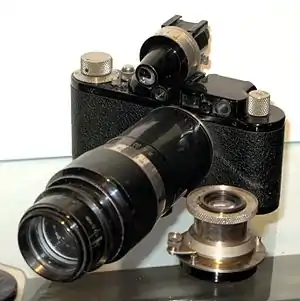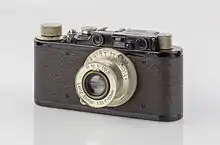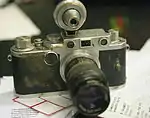Leica II
The Leica II is a rangefinder camera introduced by Leica in 1932. They were the first Leica cameras with a built-in rangefinder. Several models were produced over the years, in parallel with the Leica III series from 1933.
 | |
| Overview | |
|---|---|
| Type | 35 mm rangefinder camera |
| Lens | |
| Lens mount | M39 lens mount |
| Focusing | |
| Focus | manual |
| Exposure/metering | |
| Exposure | manual |
| Flash | |
| Flash | cold shoe |
The Leica II uses a coupled rangefinder distinct from the viewfinder. The viewfinder is set for a 50 mm lens; use of shorter or longer lenses requires installing an alternate viewfinder on the accessory socket.[n 1]
A mere four copies of the gold-plated Leica Luxus II were made. In 2013, one sold at auction in Hong Kong for $HK4 million, after featuring on the BBC's Antiques Roadshow programme.[1][2] The whereabouts of the other three models are not recorded.[2]
The popular Soviet camera, the FED 1, was a clone of the Leica II.
| Model name | Manufacturing dates | Features or improvements | |
|---|---|---|---|
| Leica D (Leica II) | 1932–1948 | like III but without slow speeds on frontal dial |  |
| Leica IIc | 1948–1951 | Die-cast body like the IIIc | |
| Leica 250 DD | – | Leica II-based Leica 250 Reporter | |
| Leica IIf | 1951–1956 | Similar to the IIIf, without the slow speed dial |  |
Notes
- Unification of the rangefinder and the viewfinder occurred with the introduction of the Leica M3, allowing quick framing and focusing in a single operation. The M3 viewfinder is also able to display viewlines for 50, 90 and 135 mm lenses
References
- Antiques Roadshow, BBC One, 29 December 2013
- "Rare Leica camera fails to set record at Hong Kong auction". BBC Online. 2013-11-22. Retrieved 29 December 2013.
External links
| Wikimedia Commons has media related to Leica II. |
